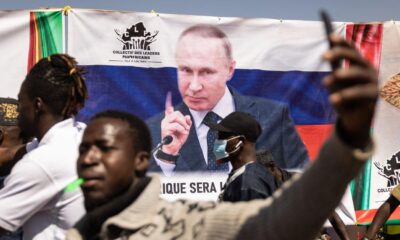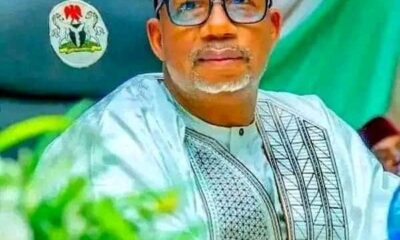National Issues
A collapse or restructure? Nigeria’s dilemma (Part I) -By Rees Chikwendu

Sometimes you just cannot help yourself but to rationally join a discourse and contribute to its storyline, especially one that touches on your arousal. The urge to participate could even be stronger when the discussion is on the threshold of your expectancy. This is how I feel right now – therefore, I am writing this…
Many times we see the rise and fall of storylines – either those that change history or shape it. You just have to be observant to pick up on a storyline and to make the best out of it. Storylines could travel as a pack of patterns, impressions, arousals, distractions – and certainly, with some consequences. Of course, they can be plagued with uncertainties and ambiguities, which are normal in discourses and storylines. This is the situation in Nigeria at the moment – the rise of distinct storyline calling for a restructure of the country economic and socio-political establishments. Traveling with this storyline are distractions that attempt to faint and fade the voices for restructure.
On the one hand, there are many (significant) Nigerians calling for the restructure of the country based on desirability and to enable the triumph of good over evil stultifying the emergence of a nation from its existence. This group argues for a Nigerian nation-state of regional governance away from the current center-oriented system. The underlying conviction: the belief that it will strengthen the spirit of Nigerianess towards achievement and excellence.
On the other hand, there are some who have been distracted and impressed by the status quo or the hegemone order to remain in the centralized system that has dwindled Nigerian fortunes. Some within this later group are plagued by uncertainties and ambiguities. They are unhinged as to the consequences of practicing regional-oriented governance system (in Nigerian political parlance, “true federalism”), especially to the seemingly poor states and regions in the country. They are perturbed by questions such as: How will the poor states and regions survive economically? What will the trade-offs for actualizing a true federalist Nigerian state be?
Thus, we can say that at the moment there are competing discourses that occupy the public space in Nigeria, with respect to its future. Do not mistake this for a lack of distinctiveness. If you carefully weigh the opinions or content-analyze them, majority of Nigerians aspire for true federalism. However, the elites – or the establishment, mainly the northern oligarchs – do not want to yield. They are comfortable, perhaps too comfortable with the current system, because it’s greatly in their advantage. These elites live in the abnegation of the need for imminent change of Nigeria’s political system and structure. It seems they have built a firewall for themselves against whatever consequences that their neglect will bring.
Therefore, based on these ideological dispositions, we can categorize the Nigerian debate for restructure into the growth mindset and the fixed mindset. I don’t like the fixed mindset.
But…
Is there any real need to be unhinged with regards to the call for restructure? Well, I do not foresee any. There is no need for the elitist backlash on the urgency of true federalism. This is because Nigeria once practiced regional governance system, and the country made significant development (economic and bilateral) under it. So, maybe, all that is needed is to readopt the federal constitution and modernize it where necessary. Why do we have constitutional experts, by the way? If Nigerians want true federalism, give them one under a people-oriented constitution. I think the wheel of true federalism has been invented in the form of the previous federal constitution. Why not build on it? No need to reinvent the wheel.
Agreed, the memory of the civil war is still a clog on the wheel of Nigeria’s progress. There is still a post-traumatic Biafran syndrome in Nigeria. But it is time to put aside the ill feelings of that war through honest reconciliation and to fashion a nation out of the country. It is not something impossible.
The Nigerian restructure storyline is begging for an interventionist. However, the Nigerian leadership has not beckoned to its option. The government has failed to create, at least, platforms that would enable the simplification of the components of the discourse, to integrate them into meaningful and compelling public policy actions. So far, past and present Nigerian governments have failed in understanding the real issues of the storyline. They have been distracted and impressed by their political power and cocoon of wealth, neglecting the obvious call of the people to restructure the country into viable and progressive nation. This path taken by the elites and each day of their inaction to the call of the people is septic to Nigeria’s defects – which will bring its collapse.
We should understand that throughout history in the study of man’s socio-political problems, nation-states suffer conflicts and wars because there are few men in positions where they indulge their kingly ambitions. Rather than choose the path of peace that advance simultaneous interests of all citizens, such men in some perverse sense of devilry seek ambitions that burn on the blood of the citizens. They indulge in ambitions that oppress and repress citizens of the society rather than protect and defend them.
Nigeria’s defects are becoming too many that it would only require an ingenious war strategist to pull the trigger of war. Gangrene is about to set in on Nigeria’s infections. In evidence, Nigeria is well equipped for a collapse. No one should underestimate the precociousness of another civil war in Nigeria. Already Nigeria has several collapse trigger points: Boko Haram in its Northeast, militants in its Niger Delta, OPC in its Southwest, MASSOB and IPOB in its Southeast, Shiite group in its Northwest, Fulani terrorists all over the country, etc.
One can only laugh at those elites who are too comfortable in their humdrums that Nigeria is indivisible and non-negotiable. And those who mock God when they say Nigeria was created or ordained by God. They have created this hackneyed old saying as a way to reduce their cognitive dissonance to the reality on ground. They keep reassuring themselves that Nigeria is still a baby in the life of a nation. In other words, the people must keep waiting for a thousand years before their aspirations can be achieved. Shamefully, those holding this view call themselves elder statesmen.
What is the truth about Nigeria?
To be continued…









